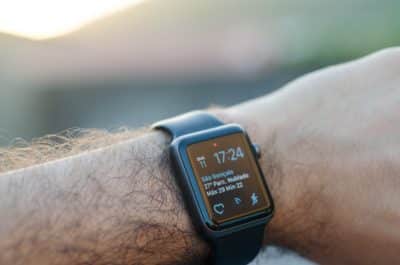The age of trying to track your daily habits yourself on paper only to forget or—let’s be honest—fib a little bit about how long you actually exercised are over now that wearable tech exists. Thankfully, modern developments in both hardware and software have a solution.
Whether you want to sleep better, exercise more, or just want to track your health in general, technology has come a long way to help you achieve your health goals. While some may not like the idea of wearing a device to collect their personal data, these devices are completely safe and can improve your life dramatically.
Nowadays, wearable tech like the Apple Watch and Fitbit have helped countless people reach their fitness goals, and, in some cases, even saved lives. In this article, personal trainer and overall exercise fanatic, Austin Alexander Burridge, shares six benefits that wearable tech has to offer the fitness community.
IMAGE: UNSPLASH
1. Activity Levels
The primary responsibility of wearable tech is to monitor your activity levels. In a way, it’s like an advanced version of a pedometer; it tracks how many steps you take every day, distance traveled, how long you exercised, and can even tell you how many calories you burned.
Then, you can access the information either through connecting it to a device, most likely via Bluetooth or wi-fi, or if it has a touch screen. Given the small screen size, the latter may be less than ideal; however smartphone applications for biometric analysis are getting better all the time.
2. Heartrate
When exercising, it’s important to know your typical heart rate to determine what level of activity is healthy. Otherwise, you can run the risk of pushing yourself to a cardiac emergency or serious injury. Wearable tech automatically and accurately tracks both your heart rate while resting and during physical activity so that you can conveniently check it and know you have a reliable result.
Though keep in mind that the ideal heart rate for resting and exercising varies by age. For example, the average resting heart rate for adults is usually between 60 and 100 beats per minute. If you have any concerns regarding your heart rate levels, share the data collected by your wearable tech with your primary care physician.
3. Sleep Patterns
Sleep is a crucial part of maintaining your health, but it can be difficult to keep track of sleeping patterns; it can be even harder to determine the true quality of sleep. Today’s wearable technology can determine when exactly you fall asleep, body temperature, any movements during the night that might disrupt it, and how well you slept.
The tech’s app typically categorizes sleep patterns into the following: awake, REM (Rapid eye movement), light, and deep sleep. An ideal sleep cycle for healthy adults involves approximately 13-23 percent of deep sleep and 20-25 percent of REM. Light sleep fills in the rest.
4. Stress Levels
Another essential part of a healthy lifestyle is balancing stress, but sometimes it can become such a regular part of life that it’s hard to notice it. As mentioned above, most smartwatches and bands track many aspects of a person’s health, such as their sleep, temperature, heart rate, and physical activity, which can all clarify stress levels.
Some watches can also detect a person’s blood pressure. Certain wearables, like Fitbit, provide a “relax” feature that guides the user through a series of breathing exercises that help reduce elevated heart rate and, in turn, lower stress levels.
5. Alerts You
You wouldn’t expect them to, but smartwatches can be a real lifesaver. Because smartwatches track users’ health, it can alert them of unknown heart conditions. Many people claim that they owe their lives to their watch for notifying them of an unusually fast or irregular heartbeat.
6. Connects To Other Devices
Lastly, these smart devices come with the convenience of being able to connect to other devices so that you can easily access their data. Some even have phone features that allow a person to receive calls, texts, and emails. With wearable tech, you have the world and your health at your fingertips.
About Austin Alexander Burridge: Austin Alexander Burridge is a dedicated personal trainer who specializes in curating fitness plans and regimens focused on well-being. He believes exercise and a healthy diet are worthy endeavors and encourages everyone to discover an active lifestyle with positivity and safety.
If you are interested in even more technology-related articles and information from us here at Bit Rebels, then we have a lot to choose from.


COMMENTS